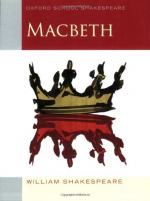|
This section contains 1,903 words (approx. 7 pages at 300 words per page) |

|
Lady Macbeth is not the only Force Causing Macbeth's Fall
Summary: Lady Macbeth had a great deal of influence on Macbeth, her husband, in committing evil deeds in William Shakespeare's "Macbeth." She uses manipulation and mocking to get Macbeth to do what she wants. However, she is not the only cause of Macbeth's fall. Macbeth was also manipulated by witches and his fatal flaw was obsessive ambition.
Although Lady Macbeth cajoles Macbeth into committing the assassination in William Shakespeare's "Macbeth," she is not the only driving force. Many aspects influence Macbeth's ill-fated decision. With Macbeth's striving and need for more power, with his ambition flourishing everyday, with his wife's cajoling and three witches prophesying success, he could not stop himself from committing the deed of all deeds.
Lady Macbeth is a controversial character in the play, as well as she is a central character. She is a woman of a single purpose. She as well as Macbeth has a deep ambition to become Queen of Scotland; however, she believes that the ambition has no power without "The illness should attend it." Lady Macbeth is also determined and eager to fulfill her desire. She also provides a link between the mortal and immortal worlds. She is quite a strange character that sometimes leads the audience to...
|
This section contains 1,903 words (approx. 7 pages at 300 words per page) |

|


